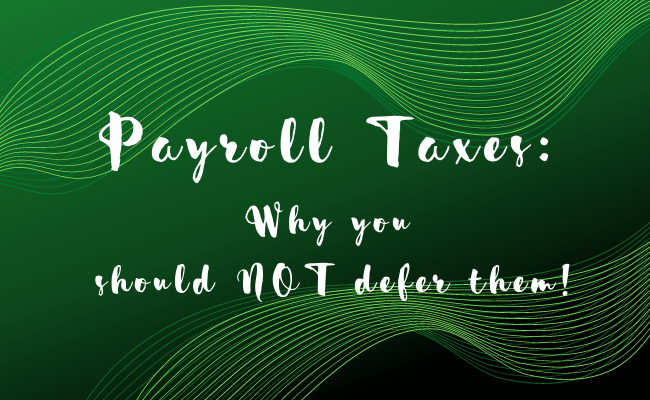Payroll Tax Deferment and Why you shouldn’t do it!
Under the Coronavirus Aid, Relief, and Economic Security (CARES) Act, as an employer you can defer the Social Security tax for employees earning up to $137,000 in 2020.
It sounds like a good deal right? WRONG!
First the fine print:
Employers are allowed to defer paying their 6.2 percent share of the Social Security tax on wages paid to employees through the end of 2020.
Fifty percent of these deferred taxes will have to be paid during 2021 and the remainder in 2022.
Whi ch Taxes Can Be Deferred?
ch Taxes Can Be Deferred?
The deferral applies only to the employee portion of the Social Security tax due on wages paid f
rom September 1, 2020, through December 31, 2020. No other payroll taxes can be deferred.
Which Employees Qualify for the Deferral?
Only employees who earn less than $4,000 biweekly qualify for the deferral. Employees who are not paid on a biweekly basis qualify if their pay is equivalent to less than $4,000 biweekly.
Here is where it gets confusing as only taxes can…
Each pay period is tested separately. An employee who earns too much during one pay period can still qualify for the deferral if he or she earns less than the ceiling amount in a later pay period.
See I told you… confusing!
Is the Deferral Mandatory?
NO! Employers are not obligated to offer the deferral to their employees.
What Happens When the Deferral Period Ends?
IRS guidance provides that the deferred taxes must then be paid “ratably” from wages paid from January 1, 2021, through April 30, 2021.
In other words, instead of paying 6.2% Social Security taxes, you will need to pay 12.4%, this is a pay cut for affected employees for four months.
It may sound good right now as an employer, but you will need to pay this later x2. Also, it will be based on each individual’s employees payroll. Which could significantly vary, who is going to keep track of all that?
What If Employees Quit or Get Fired?

If an employee quits or is fired during the four-month repayment period, the IRS says that in this event employers can “make arrangements to otherwise collect” the deferred taxes. What form such “arrangements” could take is unclear.
See more confusion!
Interest, penalties, and additions to taxes will begin to accrue on any unpaid deferred Social Security taxes starting May 1, 2021.
Long explanation short, you are on the hook.
Due to the uncertainty involved, many employers have reportedly elected not to participate in the employee Social Security tax deferral.
This is a smart decision, a little saving now = an enormous costly headache later.
For more information, this article and many more to help your business grow are on our website cdprofessionalservices.com



